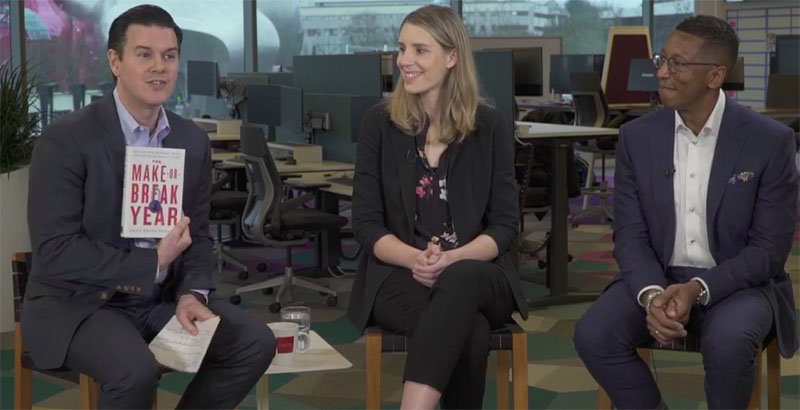Watch: ‘Make-or-Break Year’ Author Discusses on Facebook Live How Chicago Raised Grad Rates, Curbed Dropouts By Focusing on Ninth Grade

When Emily Krone Phillips was searching for a publisher for The Make-or-Break Year, her newly released book chronicling how Chicago Public Schools curbed a horrific dropout rate, one editor remarked that she seemed to be pitching two different books.
One was a tale about how networks of professionals can use data to devise multiple strategies aimed at fixing a common problem. The other was a book about how pivotal — and hard — ninth grade is for the American high school student.
Krone Phillips’s reply? “Yes.”
The author touched on both themes Thursday during a Facebook live conversation about the book hosted by the Bill & Melinda Gates Foundation. In response to questions from the foundation’s senior communications officer, Chapin Springer, Krone Phillips and Allan Golston, president of Gates’s United States Program, said they thought the collaborative problem-solving approach described in the book could have broad applications in other school systems.
https://www.facebook.com/gatesfoundation/videos/309725029736502/
The work is an outgrowth of research in the 2000s by the University of Chicago’s Consortium on School Research on the so-called freshman bottleneck, the likelihood that students adjusting to high school will fail core courses or otherwise drop balls that will cause cascading problems that quickly can push graduation out of reach. Students who are on track in ninth grade, the studies showed, are four times as likely to graduate as those who start high school behind.
Like many districts, Chicago Public Schools (CPS) was not tracking which students were at risk. Which is where Krone Phillips’s insistence on reminding readers what it’s like to be a teenager — whose brain, neuroscience shows, may not be ready for the self-accountability high school demands — comes into the story.
“Many kids struggle — and most high school grading, attendance, and accountability systems are set up to punish them for those struggles in ways that can knock them off track at school and in their lives,” Century Foundation fellow Conor Williams wrote in a review of the book for The 74. “Phillips’s account tracks the difficult, sometimes uncomfortable conversations CPS teachers and administrators have with each other — and with students — about maintaining rigor while working creatively to provide students with as much personalized support as possible.”
Freshmen OnTrack, the Chicago district’s system that’s credited with pushing the graduation rate from 52 percent in 1997 to nearly 89 percent in 2017, was the result of ground-up collaboration — often reluctant — among teachers, principals, and others to find sometimes small, straightforward fixes for ninth grade’s discrete challenges.
For the curious, the Facebook conversation should serve as a 15-minute preview of the book, as well as the foundation’s foray into promoting the process in other places. Last year Gates’s K-12 team announced more than $90 million in investments in Networks for School Improvement, such as Chicago’s Network for College Success, a consortium of 15 to 20 high schools sharing information on strategies to boost graduation and college readiness.
Disclosure: The Bill & Melinda Gates Foundation provides financial support to The 74.
Get stories like these delivered straight to your inbox. Sign up for The 74 Newsletter

;)
